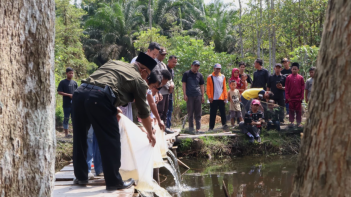Kuala Lumpur, September 19 2011. The Roundtable on Sustainable Palm Oil (RSPO) supports the Dutch Product Board for Margarine, Fats and Oils (MVO) in its call on behalf of Dutch Oil and Fats sector, for the European Union (EU) to abolish the import duty on RSPO’s Certified Sustainable Palm Oil (CSPO).
Currently, the EU is charging a 3.8% duty on crude palm oil imported into Europe. The Dutch Oils and Fats sector believes that abolishing the EU import duty on sustainable palm oil will serve to offset most of the additional costs to produce sustainable palm oil and will help to remove a significant barrier to its market uptake in Europe.
The MVO’s proposal requests that the EU levy on RSPO’s CSPO imported from Malaysia and Indonesia for use in consumer goods be abolished. Currently, crude palm oil for use in non-food products and palm oil originating from nearly all other producing countries are exempted from import duties.
Darrel Webber, RSPO Secretary General, commented: “The Dutch industry initiative once again places the Netherlands, the largest palm oil importer and processor in Europe, at the forefront of spearheading market transformation towards sustainable palm oil. The RSPO commends and supports the MVO’s resolution aimed at stimulating demand for sustainable palm oil.”
“Since the beginning of the certification process in 2008, we have witnessed increased accountability on the part of our sustainably operating palm oil producers. This has resulted in CSPO now boasting close to 5 million metric tonnes, equal to 10% of global palm oil production – an exceptional accomplishment for a commodity with such a highly complex supply chain as palm oil.
“RSPO has achieved this important result thanks to the commitment of its member companies. They understand the importance of producing palm oil responsibly and sustainably to the benefit of our people and our planet. In addition, the commitment towards 100% CSPO by 2015 on the demand side by many established global organizations – including processors, traders, consumer goods manufacturers and retailers – has been a major driver in getting growers on board.
“While such developments are a crucial step in the right direction, as demonstrated by the growing uptake of CSPO from 26% in 2009 to 56% in 2010, it is imperative that market uptake of sustainable palm oil accelerate at a greater pace to match the increasing rate of production. Industries should embrace the use of CSPO.
“The RSPO looks forward to future opportunities for dialogue and cooperation with EU decision-makers regarding the proposal made by the MVO.” Webber concluded.
The Netherlands, the fourth-largest country by RSPO membership, is also the second-largest EU consumer market in the RSPO, after the United Kingdom.
About RSPO
In response to the urgent and pressing global call for sustainably produced palm oil, the Roundtable on Sustainable Palm Oil (RSPO) was formed in 2004 with the objective of promoting the growth and use of sustainable oil palm products through credible global standards and engagement of stakeholders. The seat of the association is in Zurich, Switzerland, while the secretariat is currently based in Kuala Lumpur with a satellite office in Jakarta.
RSPO is a not-for-profit association that unites stakeholders from seven sectors of the palm oil industry – oil palm producers, palm oil processors or traders, consumer goods manufacturers, retailers, banks and investors, environmental or nature conservation NGOs and social or developmental NGOs – to develop and implement global standards for sustainable palm oil.
Such multi-stakeholder representation is mirrored in the governance structure of RSPO such that seats in the Executive Board and project level Working Groups are fairly allocated to each sector. In this way, RSPO lives out the philosophy of the "roundtable" by giving equal rights to each stakeholder group to bring group-specific agendas to the roundtable, facilitating traditionally adversarial stakeholders and business competitors to work together towards a common objective and making decisions by consensus.
— End —
For further information, kindly contact:
|
Contact for RSPO Secretariat: Anne Gabriel, Communications Director T:+603-22012053 |
Contact for Europe: Hill & Knowlton, Tanno Massar T: +32 (0)2 231 50 19 |
Contact for Indonesia: Desi Kusumadewi RSPO Indonesia Director T: +62 21 5794 0222
|
|||
|
Contact for India: T: +91-124-4967316
|
|
|
A SNAPSHOT OF KEY FACTS:
|
Total volume of Certified Sustainable Palm Oil to date: |
4.959 million metric tonnes |
|
Total volume of Certified Sustainable Palm Kernel to date: |
1.159 million metric tonnes |
|
Total production area of CSPO: |
1,027,319 ha |
|
Number of grower companies certified: |
26 |
|
Number of mills certified: |
121 |
|
Number of supply chains certified: |
105 |
|
Number of supply chain facilities certified: |
187 |
|
CSPO Uptake in 2009: |
26% |
|
CSPO in 2010: |
56% |
|
% of CSPO of global Crude Palm Oil |
10% |
|
Largest producer of CSPO in the world: |
Malaysia; over 50% |
|
Total number of members: |
Total: 672 members Ordinary Members – 509; Affiliate Members – 96; Supply Chain Associates – 67 |
|
Top 5 largest membership by country: |
1. Malaysia; 2. United Kingdom; 3. Indonesia; 4. Netherlands; 5. Germany |
|
Top 3 largest membership by stakeholder group: |
1. Processors & Traders; 2. Consumer Goods Manufacturers; 3. Growers |
Keep reading

Rowo Ombo: From Neglected Swamp to a Symbol of Hope and Conservation in Jambi, Indonesia

Save the Date: The 22nd General Assembly (GA22) of RSPO Members

Access into prisma

10 Years of RSPO in China: Driving Palm Oil Transformation Towards Sustainability

Updated Trace Function in prisma

Call for Expression of Interest: Independent Investigation of a Complaint

Latin American Smallholders, Key Global Brands Gather in Peruvian Amazon to Advance Sustainable Palm Oil

RSPO Forum for Members and Certification Bodies 2025: Strengthening Capacities and Building Bridges with RSPO Members




